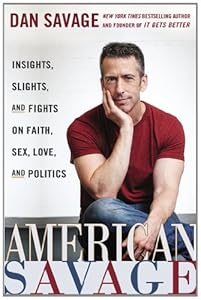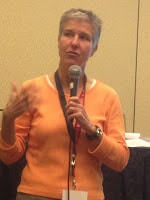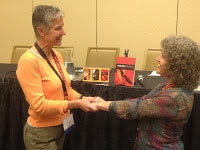Posts Tagged ‘LGBT’
American Savage by Dan Savage: book review
 Dan Savage is an outspoken, irreverent, gay sex columnist who gives sex advice to all genders and orientations at Savage Love and on his podcast. With his husband Terry*, he started the “It Gets Better” video project, designed to help kids who are bullied realize that it does get better.
Dan Savage is an outspoken, irreverent, gay sex columnist who gives sex advice to all genders and orientations at Savage Love and on his podcast. With his husband Terry*, he started the “It Gets Better” video project, designed to help kids who are bullied realize that it does get better.
So I was prepared to like Dan’s new book. I had no idea that I would love it, highlight it, bookmark it, rave about it. I had no idea that Dan could write so eloquently, and from the heart. For example:
- “Sex education in America is a lot like a driver’s-ed course that covers the internal combustion but not steering or brakes…so long as we skip past pleasure, desire, and negotiating a romantic or sexual relationship … we aren’t really teaching young adults about sex.”
- “Fighting your sexuality is like holding your breath: It can be done, yes, but not for long (when it comes to your breath) and not forever (when it comes to your sexuality).”
Politically, Dan is razor-sharp. His one-hour, dinner table debate with Brian Brown, President of the National Organization for Marriage, about gay marriage is worth watching on YouTube — but what you don’t know about what happened before and after the debate is here in American Savage, such as the one question Terry asked after the debate was over:
“Do you think our son should be taken away from us?”
“You shouldn’t ask me a question when you know you won’t like the answer,” Brown said.
“Get the fuck out of my house,” Terry said.
Dan’s personal stories are moving, especially when he writes about his mother’s death, his husband, or his son. Each time he speaks from his heart with a story from his own life, it is to illustrate or lead us to an important point.
Dan Savage makes you think about things you thought you knew. For example, when is/isn’t it okay to cheat?
“We are socially monogamous — we pair bond; we couple up… but we are not sexually monogamous… The fact that your partner is willing to ‘forsake all others’ only means something is your partner doesn’t, on some level, want to forsake all others. and your partner doesn’t.”
How can you help laughing when he writes about Rick Santorum (“then the third most powerful person in the United States Senate [who] equated gay people to child rapists and dogfuckers”) and Dan’s campaign to launch a new meaning for the word “santorum”: “the frothy mixture of lube and fecal matter that is sometimes the byproduct of anal sex” in our culture and in Google searches.
I could go on for another hour, but here’s the bottom line: I recommend American Savage to everyone, straight or gay, who cares about how confused our culture is about sexuality and religion and politics. Please read this book and share it with people in your life who agree with you — and those who don’t.
*Okay, since I’m being honest here — I drool over the photo of Dan’s husband Terry posing in underwear, which I’ll share here with you, at the risk of undermining the intellectual nature of this book review.
 |
| Terry posing in underwear |
Marriage Equality and more: LGBT Seniors
 We’re all reading and talking about gay marriage / marriage equality this week. I’d like to invite our LGBT Boomers, seniors, and elders to comment here about their lives growing up without acceptance or equality.
We’re all reading and talking about gay marriage / marriage equality this week. I’d like to invite our LGBT Boomers, seniors, and elders to comment here about their lives growing up without acceptance or equality.
In high school, I had a guy friend who, I learned 50 years later, was gay. How much it would have accelerated my own education and evolution if he had felt he could talk to me about that then. But he didn’t. Maybe he felt he couldn’t. Maybe he thought it was none of my business. Maybe he wasn’t sure. He dated girls at that time.
Fifty years later, when we met again, I asked if he was married. He told me nonchalantly that he was in a decades-long relationship with a man. He said he wasn’t hiding it — he just informed people who asked.
 At CatalystCon East this month, I attended Terri Clark’s session, “The Silver Rainbow: Working with LGBT Seniors.” There are more than 1.5 million LGBT older adults in US today, and by 2030,
At CatalystCon East this month, I attended Terri Clark’s session, “The Silver Rainbow: Working with LGBT Seniors.” There are more than 1.5 million LGBT older adults in US today, and by 2030,they’ll number more than 3 million, Terri told us. She is co-chair of The LGBT Elder Initiative
(LGBTEI), which is “committed to assuring that lesbian, gay, bisexual
and transgender older adults have rights and opportunities to live
vibrant, creative and mutually supportive lives.”
you cease to exist.”
I thought I was well-informed, but this session made my jaw drop, especially when Terri showed a short film from Project Visibility (trailer below). In it, people talked about their need to be closeted growing up. “We always kind of lived a lie,” they said. “That was your life and you’re not able to share it. Your story would be missing.”
Even decades later, they lost jobs, family, and their faith community when they came out. One college professor was told, “We don’t have room on the faculty for you any more.”
Many LGBT seniors are still closeted today. This makes them afraid to access senior health and legal services that the rest of us take for granted.
 Yes, marriage equality is important. But that’s not the only chapter in this story. Gay or straight, young or old, religious or not, activist or not, we need to come together, stand up tall, and speak out loud for equality for all of us, in all aspects of our lives.
Yes, marriage equality is important. But that’s not the only chapter in this story. Gay or straight, young or old, religious or not, activist or not, we need to come together, stand up tall, and speak out loud for equality for all of us, in all aspects of our lives.
In the words of one of the interviewees, “It’s who we are. It’s not a moral issue.”
Dear John, I Love Jane: book review

Dear John, I Love Jane — isn’t the title perfect? — is a 2011 anthology edited by Candace Walsh and Laura André (who happen to be a couple) and written by women who left their straight life/ relationships/ husbands because they fell in love with women.
Some always knew they were attracted to women, but bowed to society’s norm and married men anyway. Others had no idea they could or would fall in love with a woman.
The stories are engrossing, well-crafted, intimate, and dramatic. I felt I was sitting in a room hearing these women’s personal stories — their conflicts, thrills, misgivings (sometimes), and declarations.
When Seal Press offered me this book to review, I emailed back, “I hope some of the stories highlight women over 50.” I was surprised and pleased to learn that several of these authors are over 50, and in case you want to read their stories first–as I did–here are their names: Leigh Stuart, Sheila Smith, Susan Grier, Meredith Maran, Kami Day, Micki Grimland, and Katherine Briccetti.
I loved many of the stories, including “Memoirs of a Wanton Prude” by Sheila Smith, who first fell in love with a woman at age 69. As a teen, she was taught that gays and lesbians were “Sick! Immoral! Perverted!” and she fought back her feelings until age 50. Still, she stayed with her husband, “reading lesbian books and [keeping] my feelings about women under wraps. A divorce and a few years of solitude readied her to meet Diana, who taught her that “Lesbians are about intimacy”: “It wasn’t so much she wanted to go to bed with me; it was that she wanted to wake up with me.”
One of the most moving stories to me was “The Right Fit” by Kami Day (also over 50), who was raised Mormon and was taught that “Heavenly Father had made one man whose penis would fit just perfectly inside my vagina,” and that perfect fit would be revealed on her wedding night. It wasn’t. But 15 years later, the perfect fit arrived: Michele. And 15 after that, they are still together, “using only about half the mattress in our double bed.”
The writing is terrific — often lyrical, sometimes funny, and full of surprises. For example:
- “I have always been far more turned on by our magical, slippery little orchid than by their — what is that? A puppet? Some sort of sea creature?” (Veronica Masen)
- “My body has a need that’s burning a hole through the mattress. My brain is hanging on for dear life to what remains of my heterosexuality.” (Meredith Maran)
- “I had never imagined kissing another woman, but now I did, wanting to know the gentleness of soft skin, the taste of female, this female.” (Susan Grier)
- “I had recurrent dreams of making out with Ellen DeGeneres in a rustic Spanish house in Santa Barbara.” (Leigh Stuart)
Dear John, I Love Jane is an important book. It is more than a lesbian anthology — it’s about women making choices at first that go counter to what they really want or need (and isn’t that especially true of our age group?), then facing and accepting — and being thrilled by! — their true natures. It shows women’s sexual fluidity in a way we seldom see or acknowledge.
When I was writing Naked at Our Age, several women over 50 sent me their stories about marrying men (some quite contently, others battling their nature) and in later life discovering love with another woman — or wanting to experience sex with another woman and not yet putting it into action. If this book had been out then, I would have recommended it. I recommend it now!
Purchase the Dear John, I Love Jane on Amazon or order from your independent bookseller.
As always, I welcome your comments.
Sue Katz Film Review: Gen Silent
Guest blogger Sue Katz is a wordsmith and rebel, offering frank talk about aging, sex, the Middle East, class rage and ballroom dancing. She used to be most proud of her martial arts career, her world travel, and her voters’ guide to Sarah Palin, Thanks But No Thanks, but now it’s all about her blog, Consenting Adult.
Sue recently reviewed Gen Silent, a documentary about LGBT elders who go back in the closet when they need long-term nursing facilities. It’s a topic that even LGBT activists rarely look at. Thank you, Sue, for permission to republish excerpts from this review. Visit the original for the full-length review.
This emotive documentary helped me clarify what should really be among the priorities of the LGBT community. When one considers all the resources that have been lavished on lobbying for equality in the sorry military/marriage institutions, the issues surrounding LGBT aging seem to be a more pressing and much more widely relevant front on which to focus our struggle. In the best of circumstances, we’re all going to get old.
“Gen Silent,” directed by Stu Maddux, is a documentary based in Boston about local ageing queers. What are their options? Who will look after them when they need help? How do elder and nursing facilities treat LGBT elders? Will they have to go back into the closet if they need care?
By following individuals and couples and allowing them to tell their stories, Maddux draws us in with a sense of both identification and admiration. Sniffles and quiet sobs marked the showing, for no one among us could avoid a sense of vulnerability as we approach old age.
With senior facilities too often lacking in consciousness of queer and trans needs, even some of the earliest gay militants are now facing the possibility of having to return to the closet in order to safely get the care they need.
When Lawrence Johnson can no longer care for his older partner of many decades, he must place him in a nursing home. But his partner feels too paranoid to be out, limiting the ways in which Lawrence can comfort him. Eventually, Lawrence finds a more open and supportive facility, so that he and his partner can hold hands without looking over their shoulder.
Sheri Barden and Lois Johnson are hoping to stay in their own home, for they live in a neighborhood with many long-time, close queer neighbors. But they are also aware of the kind of dangers any institution might hold for out lesbians – from physical and sexual abuse to isolation and ostracism.
KrysAnne Hembrough’s severe breathing problems are preventing her from taking care of herself. But her late-life transition has left this transgender woman with nothing but hostility from her entire biological family. Medical people, too, have expressed revulsion and have refused to touch her body.
“Gen Silent” is more than a top-notch documentary. It is a conscious-raising tool that needs to be shown widely in mainstream elder institutions and among professionals working with older people. It needs to be shown to LGBT people of all ages so that this important discussion becomes a key issue for our movements.
Unfortunately, “Gen Silent” is an underfunded project that could use support – both financial and in terms of distribution. The visionary director Stu Maddux asked for human and material resources to get the film out to the nooks and crannies of our aging lives. Visit his website to learn more.
And check out the trailer below, presented under the righteous banner: The generation that fought hardest to come out is going back in – to survive.